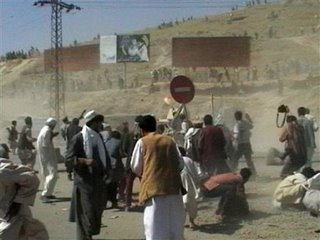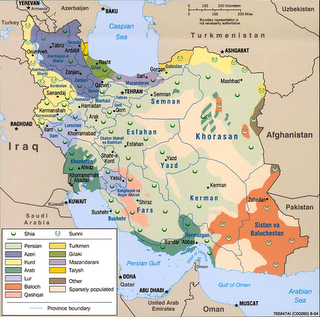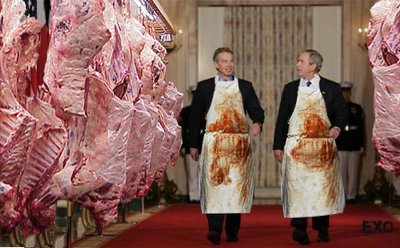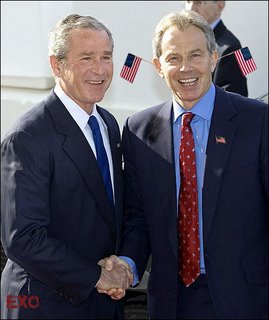Independent
An inability to protect its citizens. The belief that it is above the law. A lack of democracy. Three defining characteristics of the 'failed state'. And that, says Noam Chomsky, is exactly what the US is becoming. In an exclusive extract from his devastating new book, America's leading thinker explains how his country lost its way
The selection of issues that should rank high on the agenda of concern for human welfare and rights is, naturally, a subjective matter. But there are a few choices that seem unavoidable, because they bear so directly on the prospects for decent survival. Among them are at least these three: nuclear war, environmental disaster, and the fact that the government of the world's leading power is acting in ways that increase the likelihood of these catastrophes. It is important to stress the government, because the population, not surprisingly, does not agree.
That brings up a fourth issue that should deeply concern Americans, and the world: the sharp divide between public opinion and public policy, one of the reasons for the fear, which cannot casually be put aside, that, as Gar Alperowitz puts it in America Beyond Capitalism, "the American 'system' as a whole is in real trouble - that it is heading in a direction that spells the end of its historic values [of] equality, liberty, and meaningful democracy".
The "system" is coming to have some of the features of failed states, to adopt a currently fashionable notion that is conventionally applied to states regarded as potential threats to our security (like Iraq) or as needing our intervention to rescue the population from severe internal threats (like Haiti). Though the concept is recognised to be, according to the journal Foreign Affairs, "frustratingly imprecise", some of the primary characteristics of failed states can be identified. One is their inability or unwillingness to protect their citizens from violence and perhaps even destruction. Another is their tendency to regard themselves as beyond the reach of domestic or international law, and hence free to carry out aggression and violence. And if they have democratic forms, they suffer from a serious "democratic deficit" that deprives their formal democratic institutions of real substance.
Among the hardest tasks that anyone can undertake, and one of the most important, is to look honestly in the mirror. If we allow ourselves to do so, we should have little difficulty in finding the characteristics of "failed states" right at home.
No one familiar with history should be surprised that the growing democratic deficit in the United States is accompanied by declaration of messianic missions to bring democracy to a suffering world. Declarations of noble intent by systems of power are rarely complete fabrication, and the same is true in this case. Under some conditions, forms of democracy are indeed acceptable. Abroad, as the leading scholar-advocate of "democracy promotion" concludes, we find a "strong line of continuity": democracy is acceptable if and only if it is consistent with strategic and economic interests (Thomas Carothers). In modified form, the doctrine holds at home as well.
The basic dilemma facing policymakers is sometimes candidly recognised at the dovish liberal extreme of the spectrum, for example, by Robert Pastor, President Carter's national security adviser for Latin America. He explained why the administration had to support the murderous and corrupt Somoza regime in Nicaragua, and, when that proved impossible, to try at least to maintain the US-trained National Guard even as it was massacring the population "with a brutality a nation usually reserves for its enemy", killing some 40,000 people. The reason was the familiar one: "The United States did not want to control Nicaragua or the other nations of the region, but it also did not want developments to get out of control. It wanted Nicaraguans to act independently, except when doing so would affect US interests adversely."
Similar dilemmas faced Bush administration planners after their invasion of Iraq. They want Iraqis "to act independently, except when doing so would affect US interests adversely". Iraq must therefore be sovereign and democratic, but within limits. It must somehow be constructed as an obedient client state, much in the manner of the traditional order in Central America. At a general level, the pattern is familiar, reaching to the opposite extreme of institutional structures. The Kremlin was able to maintain satellites that were run by domestic political and military forces, with the iron fist poised. Germany was able to do much the same in occupied Europe even while it was at war, as did fascist Japan in Man-churia (its Manchukuo). Fascist Italy achieved similar results in North Africa while carrying out virtual genocide that in no way harmed its favourable image in the West and possibly inspired Hitler. Traditional imperial and neocolonial systems illustrate many variations on similar themes.
To achieve the traditional goals in Iraq has proven to be surprisingly difficult, despite unusually favourable circumstances. The dilemma of combining a measure of independence with firm control arose in a stark form not long after the invasion, as mass non-violent resistance compelled the invaders to accept far more Iraqi initiative than they had anticipated. The outcome even evoked the nightmarish prospect of a more or less democratic and sovereign Iraq taking its place in a loose Shiite alliance comprising Iran, Shiite Iraq, and possibly the nearby Shiite-dominated regions of Saudi Arabia, controlling most of the world's oil and independent of Washington.
The situation could get worse. Iran might give up on hopes that Europe could become independent of the United States, and turn eastward. Highly relevant background is discussed by Selig Harrison, a leading specialist on these topics. "The nuclear negotiations between Iran and the European Union were based on a bargain that the EU, held back by the US, has failed to honour," Harrison observes.
"The bargain was that Iran would suspend uranium enrichment, and the EU would undertake security guarantees. The language of the joint declaration was "unambiguous. 'A mutually acceptable agreement,' it said, would not only provide 'objective guarantees' that Iran's nuclear programme is 'exclusively for peaceful purposes' but would 'equally provide firm commitments on security issues.'"
The phrase "security issues" is a thinly veiled reference to the threats by the United States and Israel to bomb Iran, and preparations to do so. The model regularly adduced is Israel's bombing of Iraq's Osirak reactor in 1981, which appears to have initiated Saddam's nuclear weapons programs, another demonstration that violence tends to elicit violence. Any attempt to execute similar plans against Iran could lead to immediate violence, as is surely understood in Washington. During a visit to Tehran, the influential Shiite cleric Muqtada al-Sadr warned that his militia would defend Iran in the case of any attack, "one of the strongest signs yet", the Washington Post reported, "that Iraq could become a battleground in any Western conflict with Iran, raising the spectre of Iraqi Shiite militias - or perhaps even the US-trained Shiite-dominated military - taking on American troops here in sympathy with Iran." The Sadrist bloc, which registered substantial gains in the December 2005 elections, may soon become the most powerful single political force in Iraq. It is consciously pursuing the model of other successful Islamist groups, such as Hamas in Palestine, combining strong resistance to military occupation with grassroots social organising and service to the poor.
Washington's unwillingness to allow regional security issues to be considered is nothing new. It has also arisen repeatedly in the confrontation with Iraq. In the background is the matter of Israeli nuclear weapons, a topic that Washington bars from international consideration. Beyond that lurks what Harrison rightly describes as "the central problem facing the global non-proliferation regime": the failure of the nuclear states to live up to their nuclear Non Proliferation Treaty (NPT) obligation "to phase out their own nuclear weapons" - and, in Washington's case, formal rejection of the obligation.
Unlike Europe, China refuses to be intimidated by Washington, a primary reason for the growing fear of China on the part of US planners. Much of Iran's oil already goes to China, and China is providing Iran with weapons, presumably considered a deterrent to US threats. Still more uncomfortable for Washington is the fact that, according to the Financial Times, "the Sino-Saudi relationship has developed dramatically", including Chinese military aid to Saudi Arabia and gas exploration rights for China. By 2005, Saudi Arabia provided about 17 per cent of China's oil imports. Chinese and Saudi oil companies have signed deals for drilling and construction of a huge refinery (with Exxon Mobil as a partner). A January 2006 visit by Saudi king Abdullah to Beijing was expected to lead to a Sino-Saudi memorandum of understanding calling for "increased cooperation and investment between the two countries in oil, natural gas, and minerals".
Indian analyst Aijaz Ahmad observes that Iran could "emerge as the virtual linchpin in the making, over the next decade or so, of what China and Russia have come to regard as an absolutely indispensable Asian Energy Security Grid, for breaking Western control of the world's energy supplies and securing the great industrial revolution of Asia". South Korea and southeast Asian countries are likely to join, possibly Japan as well. A crucial question is how India will react. It rejected US pressures to withdraw from an oil pipeline deal with Iran. On the other hand, India joined the United States and the EU in voting for an anti-Iranian resolution at the IAEA, joining also in their hypocrisy, since India rejects the NPT regime to which Iran, so far, appears to be largely conforming. Ahmad reports that India may have secretly reversed its stand under Iranian threats to terminate a $20bn gas deal. Washington later warned India that its "nuclear deal with the US could be ditched" if India did not go along with US demands, eliciting a sharp rejoinder from the Indian foreign ministry and an evasive tempering of the warning by the US embassy.
The prospect that Europe and Asia might move toward greater independence has seriously troubled US planners since World War II, and concerns have significantly increased as the tripolar order has continued to evolve, along with new south-south interactions and rapidly growing EU engagement with China.
US intelligence has projected that the United States, while controlling Middle East oil for the traditional reasons, will itself rely mainly on more stable Atlantic Basin resources (West Africa, western hemisphere). Control of Middle East oil is now far from a sure thing, and these expectations are also threatened by developments in the western hemisphere, accelerated by Bush administration policies that have left the United States remarkably isolated in the global arena. The Bush administration has even succeeded in alienating Canada, an impressive feat.
Read more
















